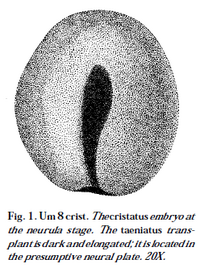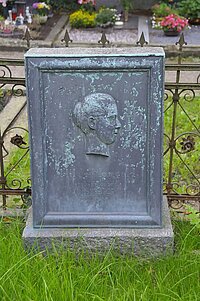Hans Spemann
* 27.06.1869 in Stuttgart † 12.09.1941 in Freiburg im Breisgau
1891 Study of human medicine in Heidelberg
1893 Transition to Munich
1894 Transition to Würzburg
Conferral of a doctorate and assistantship
1898 Postdoctoral lecture qualification
Private Lectureship
1903 Research abidance at the Stazione Zoologica in Naples (Italy)
1904 Professorship for universal zoology
1908 Professorship in Rostock
1914 Leadership of the department of evolutionary mechanics at the Kaiser Wilhelm Institute for Biology
Honorary professor
1919 Professorship in Freiburg
1937 Retirement
Starting with the Scholar of the month May 2018, the Universitätsarchiv wants to especially honor the Nobel Prize winners of the Alma Julia throughout the next year. The first one is Hans Spemann, who was awarded with the Nobel Prize in 1935 for his work on regional differentiation.
Various steps
After getting his A-levels at the Eberhard-Ludwigs-Gymnasium in Stuttgart in 1888, the young Spemann was not immediately eager to follow an academic career. At first, he started an apprenticeship as a bookseller in the store of his father, which was interrupted by his military service in 1890. Only after going on a language study travel to Lausanne in 1891, he enrolled for the study of human medicine in Heidelberg. As a student, he first transferred to Munich and afterwards to Würzburg, where he later has been receiving his first professorship. The motivation for his transition to the JMU was Spemanns admiration for the work of Theodor Boveri, who also became his lecturer and doctoral advisor.
Nobel Prize for Regional Differentiation
Spemanns greatest scientific success was the discovery of the regional differentiation. Together with Hilde Mangold, he proved with an experiment, that cells are not determined to a specific spot until a certain point at the embryonic development. For his research he transplanted cells from one spot on the embryo to another. The transplanted cells now developed according to their new position, not corresponding to their origin. Responsible for this effect is a certain kind of cell, which organizes the development of other group of cells, and therefore act as an organizer. For his research, he was nominated for the Nobel Prize in Physiology or Medicine six times, before he finally was awarded in 1935.
Unexpected problems with the doctoral thesis
Scientific research can be really annoying – despite being highly successful later on, Spemann faced unexpected problems, when it came to the topic of his doctoral thesis: The research on the reproductive behavior of tapeworms was met with disgust by the straitlaced kin of his fiancée, which then threatened to prevent the marriage. Thanks to the doughty advocacy of his doctoral advisor, Theodor Boveri, for the extraordinary scientific standard of the paper and the rather liberal reinterpretation of the topic on a philosophic common denominator (“About the paradox”) by a cousin of the fiancée, Spemann was allowed to finally marry her.

Recommended Reading:
Spemann, Hans: Forschung und Leben, Stuttgart 1943.
Sander, Klaus: Hans Spemann (1869–1941): Entwicklungsbiologe von Weltruf, in: Biologie in unserer Zeit 15 (1985), S. 112–119.
Literature of Hans Spemann:
Spemann, Hans/Mangold, Hilde: Über Induktion von Embryonalanlagen durch Implantation artfremder Organisatoren, in: Archiv für mikroskopische Anatomie und Entwicklungsmechanik 100 (1924), S. 599–638.
Spemann, Hans: Über die Entwicklung des Strongylus paradoxus, Würzburg 1895.




